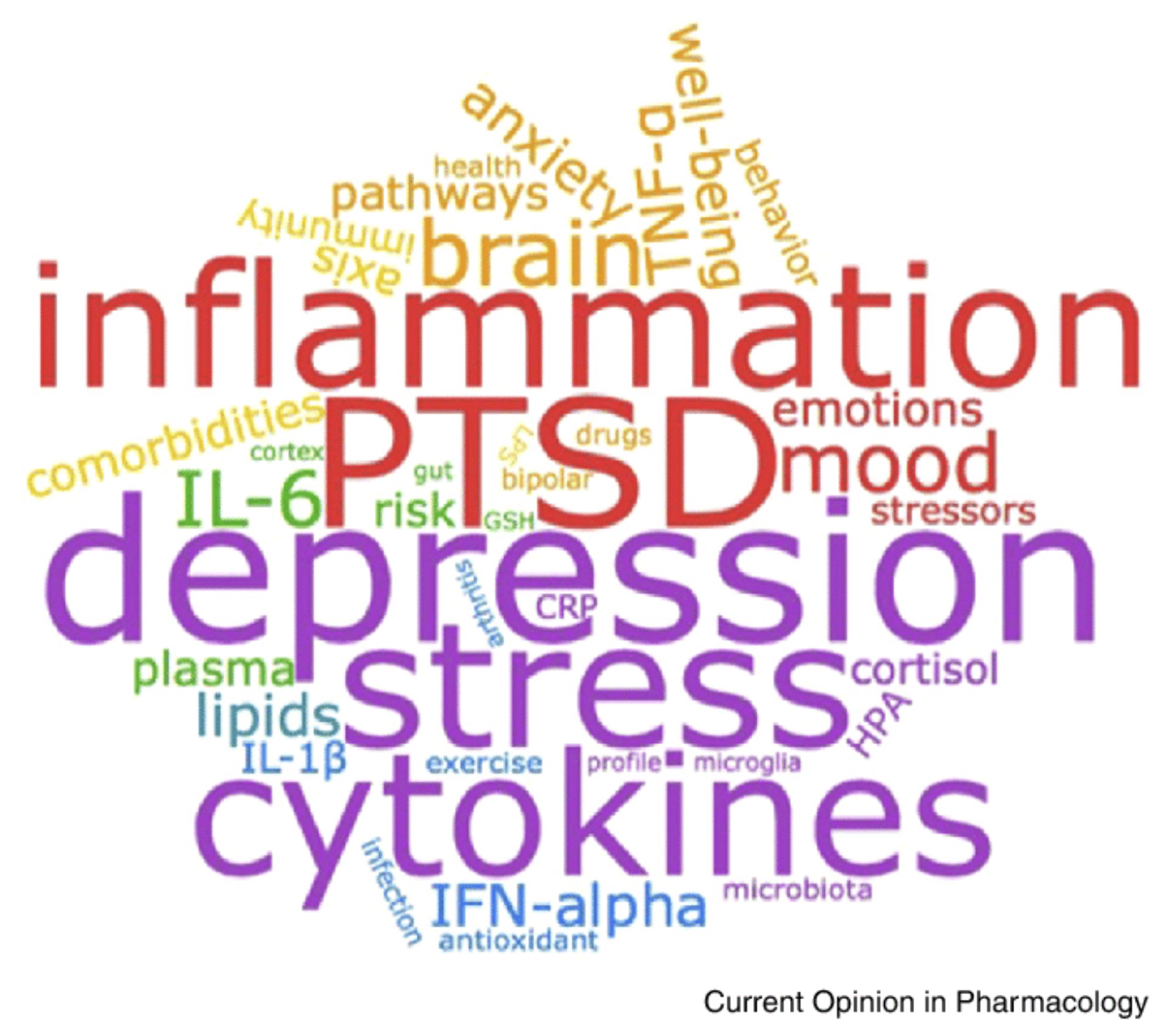There was a time in my life that I had the hardest time making decisions – it was compoundingly frustrating because they were big decisions about where to move and what to study. I didn’t like that it was so hard to know what to do and was jealous of people who seemingly had it so clear, and it was easy to feel depressed. Even though those weren’t the symptoms I listed off to the doctor as he put in the orders for some routine blood work I needed for graduate school (the main one being “why can’t I lose weight?”), I do believe those were the main symptoms I was dealing with as my mental head space and mood has been the biggest change associated with my functional medicine journey.
Research is showing that inflammation affects the way our neurons fire together – which influences how we think, how we feel, what we decide to do, and therefore how we show up in the world.
The brain and spinal cord has its own specialized immune system in the form of specialized cells called microglia. Microglia work mainly with the central nervous system (brain, spinal cord). They are “special ops”cells which have the capacity to be good house cleaners, or special ops forces, depending on what signals it’s getting from the environment they interact with. They are designed particularly to sense damage /threat to the neurons – so their role is in keeping the neurons alive as well as repaired.
Our internal world – thought patterns, information processing, memories, even moods – and the quality of them are a reflection of what is going on with the communication and connections wiring of our brain. How well that is working depends on … what type and how much clutter has accumulated there from the rest of the body… and how the brain’s immune system responds to that clutter.
The particular microglia/immune cell wrapped around all of the neurons in the brain and spinal cord change function, based on the “clutter” , or context of its environment. Certain molecules make these microglia either restorative for new neurons and heal brain damage (aka “good house cleaners” aka M2 form) OR other molecules can cause them to remove pathogens from the brain (special ops seek and destroy aka M1 form). However, if there’s too much of a particular clutter signal (causing M1 macrophages) then the activity of that special ops seek and destroy starts to go overboard and starts to degrade and impair the neurons. This is because of consistent signals it gets (and the more it destroys, the more it amps itself up) – it’s almost autoimmune in effect … but not because of an identified antibody (as of yet anyway). Kinda like hydrogen peroxide is good for removing unwanted bacteria, but if you use too much of it in a certain area … it will damage surrounding tissue that doesn’t need to be damaged.
The particular type of “clutter signal” that shifts these microglia from gentle housecleaner to overzealous house destroyer is inflammation. The specific markers assessed are TNF-alpha, interleukin 6 (IL-6), CRP, interferon alpha, and other interleukin markers (-3, -12, -2R). When exposed over a long enough period of time (depending on other factors), it starts to block neural creation, synapsing, and therefore can contribute to mood, outlook on life, and memory. Inflammation of these markers has been linked mainly to depression, and diminishing hippocampus size, which is an indicator/predictor of cognitive decline (dementia and Alzheimers).
How does inflammation get in the brain? Why doesn’t the blood brain barrier play a role in that?
Systemic or peripheral inflammatory markers (things circulating through the bloodstream in response to events going on elsewhere in the body) still get reported to the brain. These pathways are comprised of primarily the vagus nerve (as it has more of a role in reporting back to the brain what is going on in the body, mainly regulating the contents of the GI tract), and circulating proinflammatory cytokines via ventricles in the brain that don’t have an extensive blood brain barrier (in the 3rd and 4th ventricles)
So in this we learn that the amount of inflammation we have in our body – places unrelated to neurological tissue – can STILL influence the brain’s function, because of how important the brain is to be notified and regulated of what is going on in the body. These can be things from
- The gut like a gut infection or overgrowth of dysbiotic bacteria and their cellular byproducts (lipopolysaccharrides) or chemicals from food residues, or metals from water, these gets reported back to the brain via the vagus nerve. ⅔ of our immune system is assigned to monitor the gut, so any sort of excessive immune response can be investigated from the gut.
- Certain metals like mercury bind really well to nerve tissue, and the most common source of this now is in dental amalgams.
- Infections that happen in the lungs/respiratory tract (like Covid or pneumonia), or the heart (like pleurisy) where the infectious material can get circulated to the brain if its a prolonged enough response
These avenues of “reporting back” are via the blood stream (to the 3rd and 4th ventricles), and the vagus nerve.
Another source of inflammatory elevations are from direct head impact/trauma, like concussions. These will result in TNF-alpha, NF-kB, IL-6, and IL-1RA. These inflammatory markers are secreted right in the neural tissue of where the impact occurred. The ability to resolve inflammation from the area (or really any injury resulting in inflammation) is influenced by nutrient availability at that time, and whether the tissue is given a chance to recuperate. If these injuries are mild, but repeated, that will create impaired functioning of the brain.
These signals influence the brain’s inherent immune system to one that influences the brain’s physiology resulting in symptoms of depression , and other mental conditions like anxiety, and even schizophrenia, bipolar disorder have been attributed to inflammation in the brain. Impulsive behaviors, quick fix solutions, and difficulty making decisions have been found to be predicted by elevated blood inflammation and similarly pro inflammatory cytokine levels (IL-1Beta, IL-6) that are elevated results in poor delayed gratification.
How do we get the inflammation down so that my mood will improve, and I can think more clearly?
There are many lifestyle changes and factors that help decrease the inflammatory signals that get picked up in the body or the brain.
Here’s a few anti inflammatory efforts that are WORTH your resources and lifestyle change to start rebalancing your nervous system:
- Sleep – it’s basically FREE medicine. If there are difficulties with falling or staying asleep, there are certain supplements or lifestyle changes that will help with that.
- Maximize the amount of unprocessed foods you eat, as well as maximize the amount of natural color in your foods
- Moderate level aerobic exercise – as simple as enjoying the inherent beauty of the many forests we have here by going for a walk
- Meditation – This can be journaling/reflecting on thoughts, feelings, ideas, or the true practice of observing your thoughts and not getting caught up in them (imagine them drifting by). This can also be accomplished through activities done with the body, like diaphragmatic breathing, and intentional movement practice like yoga, or feldenkreis where you’re paying attention to how your body responds to the movement
- Anything that helps you feel connected to another living being in a way that is restorative to them and you
This is really powerful information to consider as we think about treating the mind, to also consider how the body may be influencing the mind.
Article based off of:
Inflammation changes our Thinking:
Additional sources hyperlinked throughout the article:
https://www.sciencedirect.com/science/article/pii/S0889159119311912
https://www.nature.com/articles/s41598-019-41437-1
https://bmjopen.bmj.com/content/2/4/e001047
https://www.frontiersin.org/articles/10.3389/fnbeh.2018.00183/full
https://link.springer.com/article/10.1007/s40750-019-00110-7
https://www.sciencedirect.com/science/article/abs/pii/S0006322309012293
https://pubmed.ncbi.nlm.nih.gov/3307672/
https://www.sciencedirect.com/science/article/abs/pii/S0006322309012293

